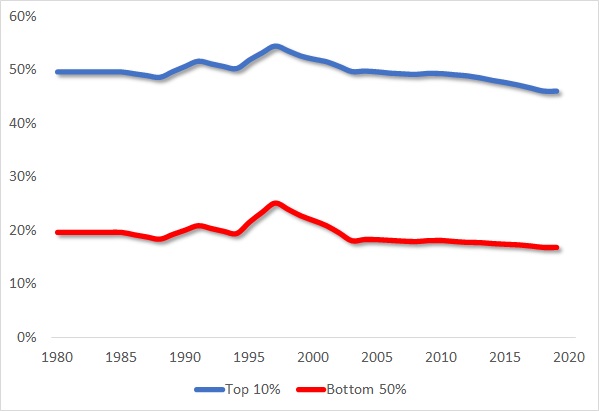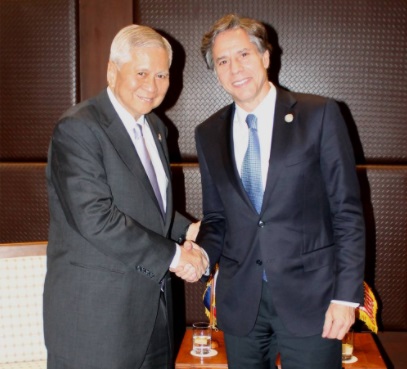Philippine 2022 Election Amid Elevated US-China Tensions – Analysis
Overshadowed by US-Sino friction and xenophobic rhetoric, the 2022 election campaigns are getting ugly. Old elites hope to derail leading candidates and create a set of US-Philippine military faits accomplis before the vote.
Recently, China and the Association of Southeast Asian Nations (ASEAN) established a comprehensive strategic partnership, a new bilateral milestone. However, the future course of the post-Duterte Philippines is less clear.
Philippine elections will be held on May 9, 2022. Will Manila deepen its integration with the ASEAN, continue to rebalance its ties between the US and China and thus foster development? Or will it opt for US ties, shun China, split the region and thus reinforce inequality.
The goal of the once-dominant pro-US liberals is to tie Manila with the US-led Indo-Pacific front and the Quadrilateral Security Dialogue (QUAD) – before the democratic vote.
The candidates, the polls
Recent surveys suggest ex-senator Ferdinand “Bongbong” Marcos dominates the presidential polls (57% of total), while Davao City mayor Sara Duterte-Carpio rules the vice-presidential campaign (54%) (see Figure 1). Marcos is the former governor of Ilocos Norte province and the only son of the controversial president Marcos (1965-86). Sara Duterte is the daughter of the incumbent president. He has a strong foothold in the north; she in the south; and both are very popular also in Metro Manila.
Figure 1 Philippine Presidential Candidates: Findings, Nov 16-18, 2021
For almost two years, the aging Liberal Party (LP) stalwarts have promoted Leonor “Leni” Robredo (15%), the wife of a late liberal politician. The remaining candidates enjoy marginal support. Francisco Domagoso (7%), an ex-actor better known by his stage name “Isko Moreno,” is the mayor of Manila. Duterte loyalists claim he is funded by the country’s oligarchs.
Senator “Bong” Go (4%), president Duterte’s longtime right-hand, headed his cabinet staff. Go’s track-record is strong, but he is relatively new in national politics and has now withdrawn his candidacy. Manny Pacquiao (3%) is known and loved for his world-class boxing career. But as a senator, his track-record is weak and as a candidate he doesn’t pull a punch. Ex-chief of national police Panfilo Lacson (3%) has made his career as an anti-corruption advocate, but enjoys little national support.
Elite politics with economic inequality
After their electoral meltdown in 2016, the liberals no longer enjoy the support of the Filipino majority. But the LP is sponsored by the country’s wealthy and supported by the US. In the coming months, the liberal interests are likely to do what they can to destabilize the Marcos-Duterte lead and comparable alternatives.
They abhor the reality that China has become the Philippines’ largest trading partner, the second largest foreign investor, and the second largest source of foreign tourists. They seek a return to the pre-Duterte status quo.
During its three-decade reign until 2016, LP failed to initiate Philippine modernization. Every fourth Filipino lived in poverty and the gap between the rich and the poor remained steep. The share of the top-10% of the national income actually increased until the late 1990s. And in 2016 it was where it had been in 1986. In this sense, the People Power Revolution left people without power. It created an expectation that “everything would change,” yet inequality prevailed.
Even today, the top-10% economic elite controls almost half of the national income, in which the bottom-50% have a share of less than 15% (Figure 2). In the Duterte era, the polarization began to fall, but the global pandemic has slowed the progress.
Figure 2 Income Inequality: Philippines, 1980-2019
Effort to preempt ASEAN-China code for South China Sea
The liberal veterans support Robredo as the head of the anti-Duterte “unified opposition” 1Sambayan. The “pro-democracy” group is led by ex-Supreme Court Justice Antonio Carpio, a major proponent of the “West Philippine Sea,” and ex-foreign secretary Albert Del Rosario, a wealthy businessman and the key player in the liberal pro-US coalition.
In contrast, Bongbong Marcos and Sara Duterte would domestically strengthen the economy after the severe pandemic recession. In foreign policy, they may try to balance between Chinese economic development and US military goals. They stress Philippine interests in South China Sea but also the ASEAN talks with China as the bilateral regional Code of Conduct (COC) is to be completed in 2022.
Hence, the frantic effort by Del Rosario and his troops to undermine the Marcos-Duterte ticket and bring Manila into the Indo-Pacific anti-China front, via increasing friction with China in the South China Sea. The goals are fostered by Del Rosario’s “think-tank” ADRi; effectively a political lobby joined with its parent Stratbase, which is linked with the Washington-based Bower Group Asia and its connections with the Center for Strategic and International Studies (CSIS), a leading US think-tank.
In October, ADRi pledged it would “make China the issue of 2022.” Hence, Del Rosario’s call on the Filipinos to “unite against Manchurian candidates,” such as Marcos and Duterte. His evidence? Marcos had met the Chinese ambassador. By this odd logic, whoever fosters US and Chinese trade and investment is a traitor.
The liberals’ anti-China hyperbola fuels anti-Chinese Sinophobia. The more Robredo has trailed in the polls, the more she has resorted to anti-China rhetoric. Domagoso has embraced populism and racist street slang targeting ethnic Chinese and China. To raise his profile, Pacquaio has accused president for giving in to the Chinese. Pledging deeper US military ties, Lacson looks “tough” in orchestrated photo-ops.
Peddling coded racism and xenophobia as patriotic duty is ugly, but sells in troubled times. As the marginal candidates know, if “Bongbong and Sara” can be played out, even small fish may look big in a shrunken pond.
Toward faits accomplis before 2022 election
According to Del Rosario, his fight for the South China Sea is for the poor Filipino fishermen. In reality, it may be more about oil extraction. He and his business associates could gain hugely from concession rights in the South China Sea. It was during Rosario’s government years that Philippines filed the arbitration case against China. That was followed by the 2014 Enhanced Defense Cooperation Agreement (EDCA), which opened the country to US military, ships, and planes; for the first time since 1991. A year later, Rosario met Obama’s then-deputy secretary of state Antony Blinken in Manila (Figure 3).
In 2016 President Duterte’s electoral triumph caused a six-year pause in these plans. But today the US-Philippines Visiting Forces Agreement (VFA) is back in effect, thanks to Del Rosario and a like-minded foreign secretary Theodore Locsin, Harvard Law alumnus; US ambassador Jose Romualdez, chair of the Philippine offices of several US-based multinational companies; and defense secretary Delfin Lorenzana, alumnus of US, UK and Australian military schools and programs.
The strategic goal seems to be a series of hard-to-reverse military faits accompli with the US before the 2022 election, perhaps via a conflict to broaden the Philippines-US Mutual Defense Treaty. First signs are promising.
In early summer, the defense secretaries of Japan and the Philippines agreed on “enhanced defense cooperation.” In October, Philippines agreed to hold over 300 military activities with the US in 2022. Foreign secretary Locsin welcomed the highly controversial US-UK-Australia security pact (AUKUS), based on Canberra’s nuclear-powered submarines, although such actions contradict the Southeast Asian Nuclear-Weapon-Free Zone Treaty (1995), the legally-binding Treaty on the Prohibition of Nuclear Weapons (2021) ratified by Philippines, and the Philippine Constitution.
Sleep-walking into old-new nightmares
Obviously, every Philippine presidential candidate has a full right to his/her policy agendas. And only the Philippines can decide its own future.
The real question is whether that future will be driven by military pacts, which benefit the economic elites, or peaceful development that would foster most Filipinos’ living standards.
In Southeast Asia, the track-record of military pacts and oligarch rule is dark, particularly after the postwar superpower rivalry was imported to the region via proxy wars.
Development and rising living standards are predicated on peace, stability and diplomacy. Anything else will split Asia and effectively undermine the promise of the “Asian Century” – and efforts to overcome Philippine economic inequality.
A version of the commentary was released by China-US Focus on Nov. 29, 2021




